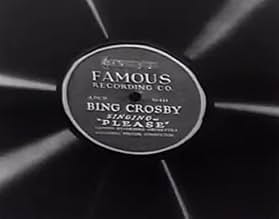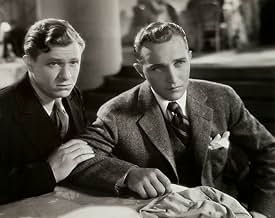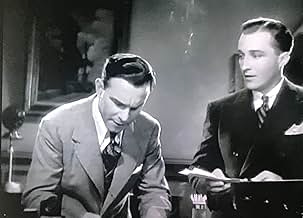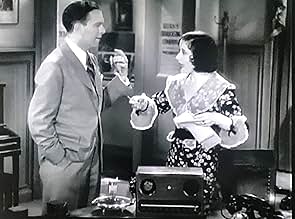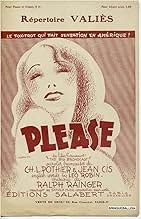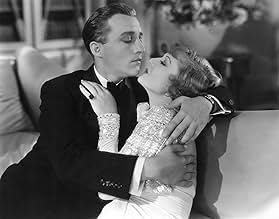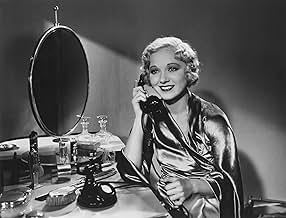Aggiungi una trama nella tua linguaA radio-singer, Bing Crosby, is none-too-concerned about his job, and an affair with Mona leads to his dismissal. When it appears Hornsby is getting and paying a lot of attention to his fian... Leggi tuttoA radio-singer, Bing Crosby, is none-too-concerned about his job, and an affair with Mona leads to his dismissal. When it appears Hornsby is getting and paying a lot of attention to his fiancée, Anita Rogers, station manager Leslie McWhinney buys the station, gives Hornsby his jo... Leggi tuttoA radio-singer, Bing Crosby, is none-too-concerned about his job, and an affair with Mona leads to his dismissal. When it appears Hornsby is getting and paying a lot of attention to his fiancée, Anita Rogers, station manager Leslie McWhinney buys the station, gives Hornsby his job back, and goes on a honeymoon with Anita.
- Regia
- Sceneggiatura
- Star
- Premi
- 1 vittoria in totale
- George
- (as Burns and Allen)
- Gracie
- (as Burns and Allen)
Recensioni in evidenza
Bing's the star attraction of this one horse town radio station, appearing for Griptight Girdles on the Griptight Girdle Hour. That is when he can get to the studio. His job is being threatened and he's also coming between Stu Erwin who buys the station and Leila Hyams who's manager George Burns's secretary.
It's a thin plot, but nicely done and it's to show off some of radio's greatest talents of that year. In addition to Bing Crosby, appearing are Kate Smith, Arthur Tracy, the Boswell Sisters, Burns and Allen, Cab Calloway and Vincent Lopez with their respective orchestras, the Mills Brothers and tenor Donald Novis.
Bing gets to sing three numbers, Please and Here Lies Love which were written for this film and Dinah. Crosby made a classic recording of Dinah with the Mills Brothers and I wish they'd reprised that for the movie. Instead it's done with a black shoeshine boy giving him a beat with the rag while Bing is scatting like Ella Fitzgerald. Bing was great, but the staging is something that black people would find offensive. Please became a great early hit for him.
Here Lies Love is sung by Crosby, but he reprises it after it's been introduced by Arthur Tracy. Tracy, a Jewish immigrant from Russia, was billed as the Street Singer and had an almost operatic quality to his voice. He rivaled Crosby, Russ Columbo, Rudy Vallee, and Morton Downey in popularity as a radio singer, but American movie audiences didn't take to him. He went to Great Britain in the mid-30s and there he became a movie star. He went back to the US after World War II and only appeared sporadically after that. Tracy was fabulously wealthy due to good investments and lived to the age of 97. He did a cameo appearance in Crossing Delancey, you'll see him briefly discussing issues of the day over the pickle barrel there.
For Kate Smith, radio was a godsend. That beautiful and powerful voice was also trapped in an elephantine body like a Wagnerian opera soprano. She was never going to be a film star. But she was radio's most popular female vocalist, no one else was ever even close and she sings a great rendition of It Was So Beautiful in The Big Broadcast.
Burns and Allen did surreal comedy that was probably only equaled by Monty Python years later. Gracie Allen was in her own world and the ever patient George gave up trying to deal with her reasoning. They did some great guest bits in films like this one and two more with Bing Crosby. But they never really carried a film by themselves with the exception of Here Comes Cookie. I did a review of that and it's the best example of their work.
Donald Novis was a popular radio tenor, totally forgotten now. He also was on the Broadway stage and in Rodgers&Hart's Jumbo introduced their classic, The Most Beautiful Girl in the World. They give him Trees to sing, Joyce Kilmer's poem put to music. I wish he'd sung something more popular.
With all these radio stars it's hard to remember that the nominal star of the film is Stu Erwin. Erwin did a fabulous job in creating some great milquetoast characters from the early talkies. The climax of the film involves a long running gag with him trying to get a recording of Bing singing Please to the studio to substitute for Crosby who's AWOL. It's done almost without dialog and it is interspersed with several of the stars previously mentioned. It's a hilarious bit of slapstick.
The Big Broadcast is enjoyable nostalgic fun and a piece of history since it's the feature film debut of America's greatest entertainer, Bing Crosby.
This entire more is tongue-in-cheek, so if you like that humor, you'll split your sides laughing. Once, Stuart enters an empty room and says to the camera, "Hmm, no chair." From off-camera, someone literally slides a chair into frame for him to sit on. In another scene, Leila Hyams says, "First I cry because I'm happy, now I want to do something even sillier." Stuart guesses, "You want to laugh because you're sad?" The main plot of the movie involves a love triangle between Stuart, Leila, and Bing, and the film discusses the concept of hero worship, celebrity crushes, and real love. All that in a silly comedy? Well, when a comedy is a good comedy, it can revolve around actual topics while still including humor. So, the answer is yes.
In one scene, Bing and Stuart wake up in twin beds with no memory of what happened the night before. "This is my bedroom," Bing says, looking at the sheets. In the neighboring bed, Stuart asks, "Are we married?" Then, in pre-Code glory, the camera captures Leila's legs as she slips her negligee and underwear off then hops in the shower. Both Bing and Stuart talk to her while she's covered in only a shower curtain, and once she's fully dressed, Stuart shows her off and says, "Feel how solid she is!" Bing looks her up and down then asks Stuart where he should squeeze. Aren't pre-Code movies grand?
Unfortunately, once the "big broadcast" actually happens, during the last thirty minutes of the movie, it's full of radio acts and singers who are no longer household names today. Modern audiences will probably be very bored by the ending, but if you're bored, just remember the hilarity of the first part of the movie.
So what is so odd? The film opens with a loudly ticking clock as everything in the radio station acts in synchronization with the sound of the clock. The steps of a messenger boy as he goes down the hall, the steps of a black cat as he walks, Cab Calloway's baton, as everybody is waiting for a tardy Bing Crosby.
When the sponsor of the show appears and demands that Bing be fired for persistent lateness, the clock face grows astonished eyes and its hands move in horror. The cat freezes and slips under a door through a half inch crack. A radio microphone grows astonished eyes when a surprising announcement is made.
Who else runs the radio station but George Burns aided by his hare brained secretary, Gracie Allen. "A lot of people around here have been driving me crazy for years and I thought for once I'd hire somebody that would drive them crazy." - Burns' explanation of why he hired this secretary.
The really oddest scene in the entire film? An attempted suicide by Bing and his new pal Leslie McWhinney (Stuart Erwin). Both just dumped by their gals, they turn on the gas in Bing's apartment and wait for the end. They begin to hallucinate, seeing a skull and dancing skeletons. Very precode. That and Stuart Erwin trying to make up with Leila Hyams while she is in the shower and he is just outside the curtain wearing her lingerie. If you want an explanation of this watch the film.
Note that Stu Erwin is top billed over Crosby as Bing's career is just starting out. In fact, this was Bing's first feature film for Paramount, the studio that would become his home. Erwin acquits himself well, including a long mute comic bit towards the end that he handles deftly.
The real reason to watch this besides the weird humor and the macabre and precode moments are the musical acts - Kate Smith, Cab Calloway and his orchestra, the Mills Brothers, and the Boswell Sisters. And Bing Crosby singing "Please" should please just about anyone.
Watch it for the comical and musical oddity that it is. I wish that somebody would clean it up and put it on physical media.
Lo sapevi?
- QuizBing Crosby's song "Please" became the inspiration for John Lennon to write the Beatles' first hit "Please, Please Me"
- Citazioni
Anita Rogers: I love somebody else.
Leslie McWhinney: Whoever he is, he's a fool if he can't see you.
Anita Rogers: [after a long pause] It's Bing.
Leslie McWhinney: Bing?
- Curiosità sui creditiFilm opens with loudspeakers, then segues to lobby cards depicting several of the featured stars "Live".
- ConnessioniEdited into The Great Radio Comedians (1972)
- Colonne sonoreMinnie the Moocher
Written by Clarence Gaskill, Cab Calloway and Irving Mills
Performed by Cab Calloway
I più visti
Dettagli
- Data di uscita
- Paese di origine
- Lingua
- Celebre anche come
- The Crooners
- Luoghi delle riprese
- Azienda produttrice
- Vedi altri crediti dell’azienda su IMDbPro
- Tempo di esecuzione
- 1h 28min(88 min)
- Colore
- Proporzioni
- 1.37 : 1

